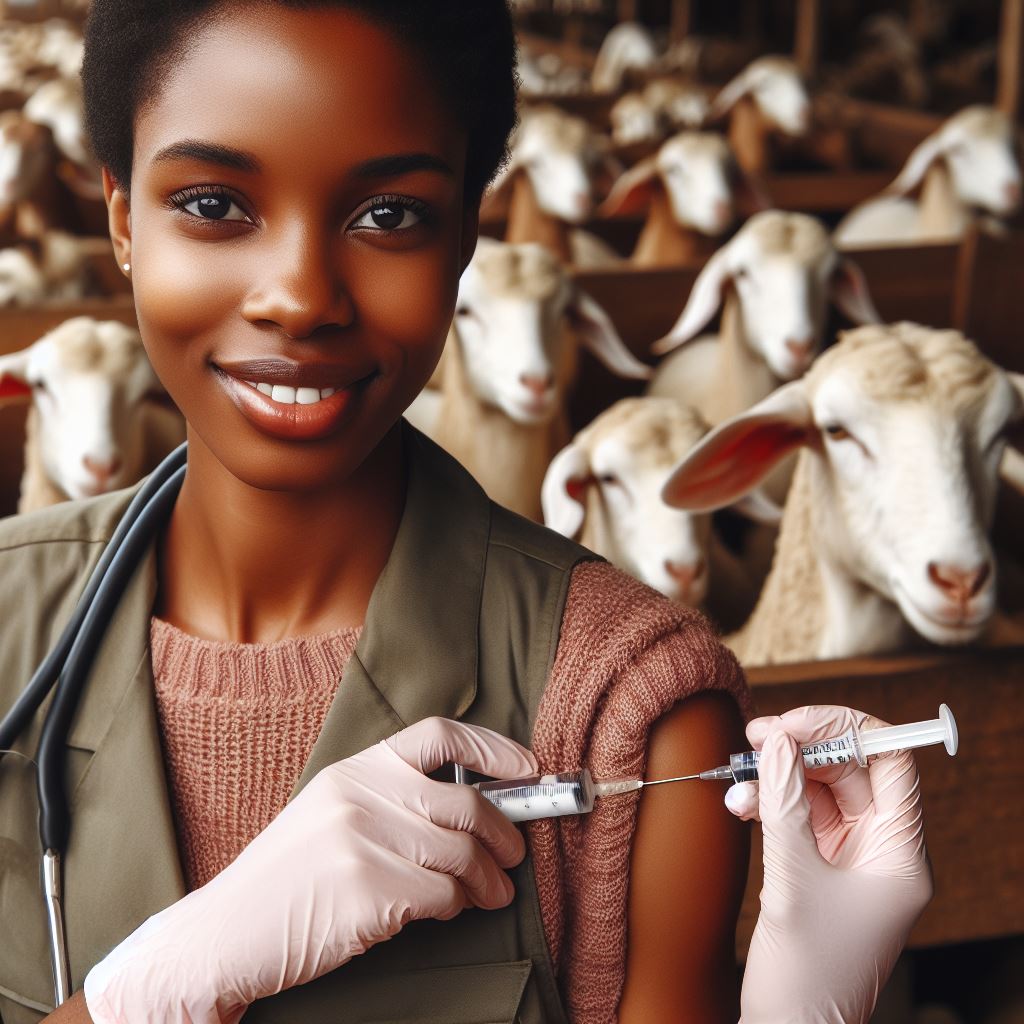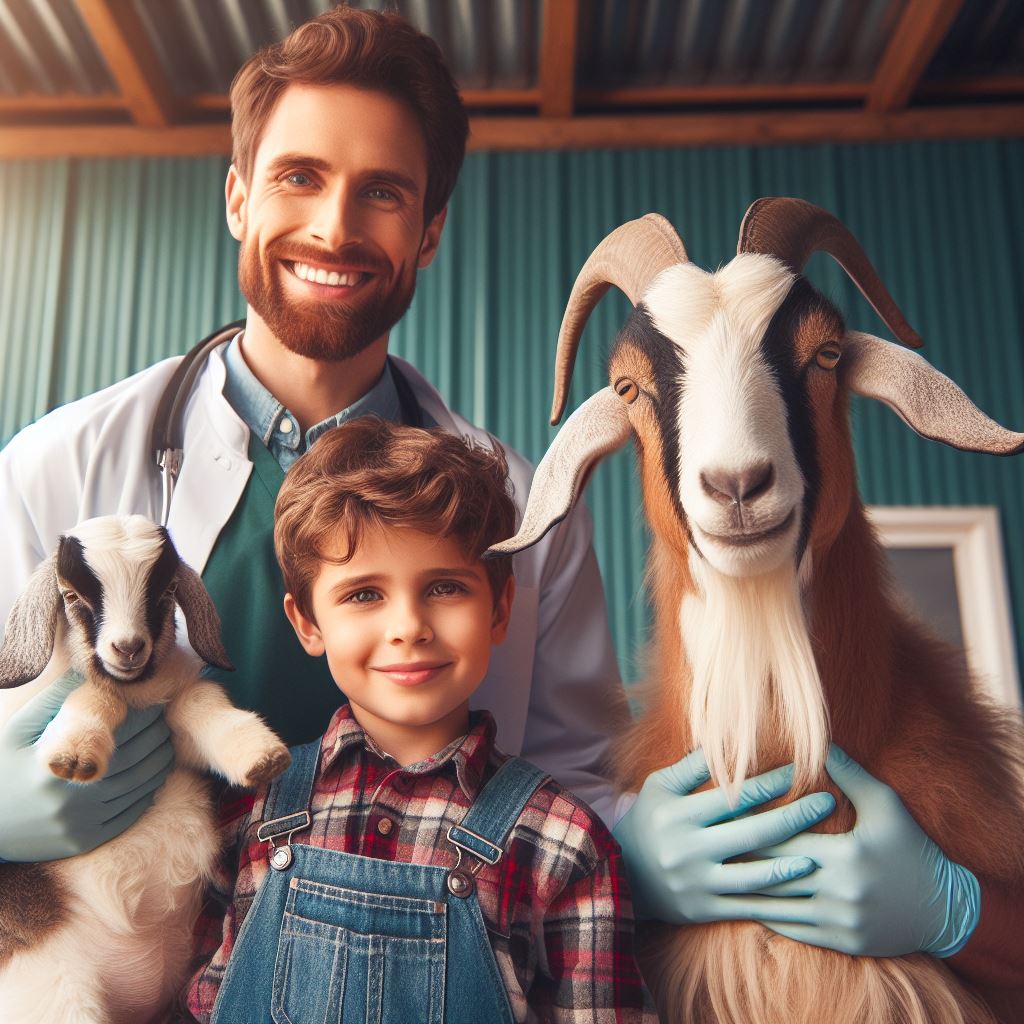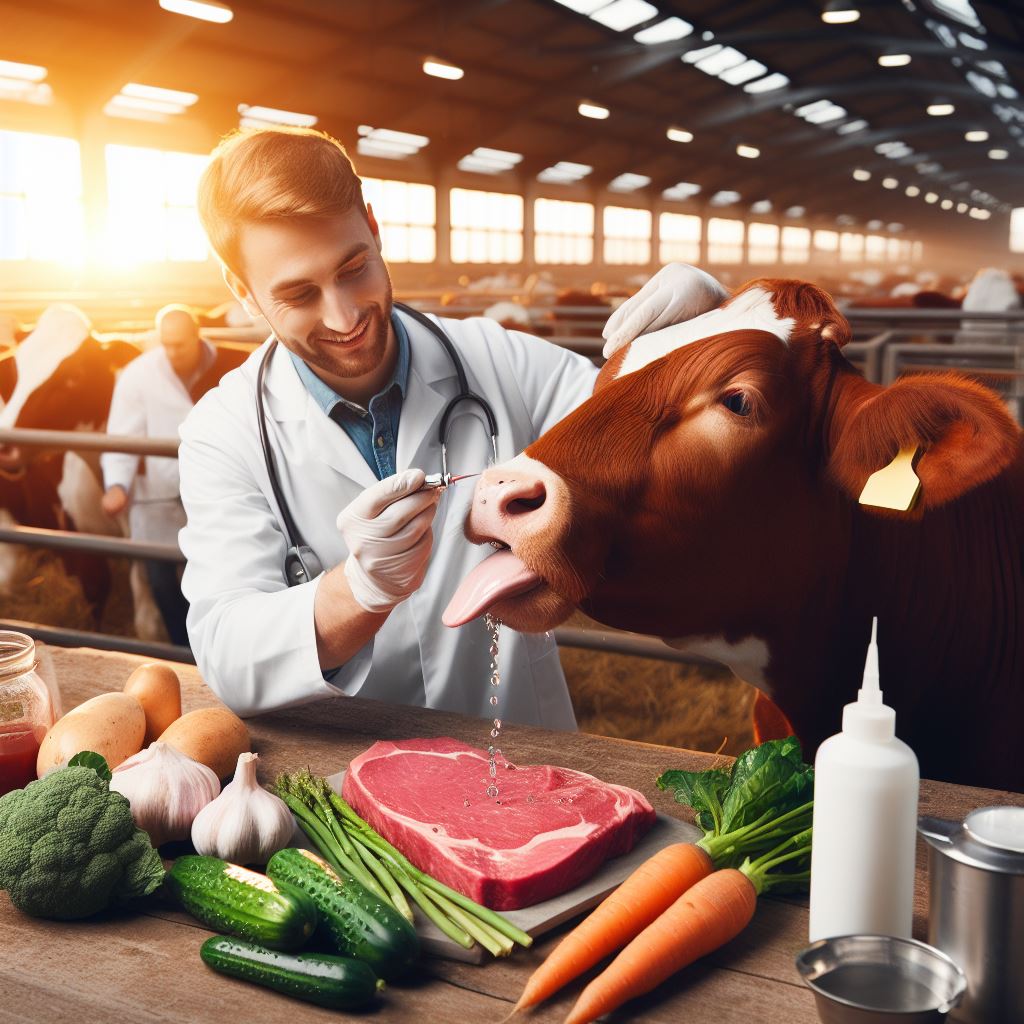Introduction
Importance of vaccination for sheep and goats
Vaccinations are a vital aspect of sheep and goat healthcare.
Proper vaccinations can prevent diseases, enhance immune responses, and improve overall health. Vaccinating these animals is essential to maintain a healthy flock or herd.
Purpose of the blog post
The purpose of this blog post is to highlight the significance of following vaccination schedules for sheep and goats.
It aims to educate readers about the importance of timely immunization to protect these animals from various infections and diseases.
Adhering to vaccination schedules ensures that sheep and goats receive essential protection against common diseases prevalent in their environment.
These schedules are designed by veterinarians and experts in the field to provide the best possible immunity for these animals.
By vaccinating sheep and goats according to the recommended schedule, owners can minimize the risk of infectious diseases within their herds.
Vaccinations help prevent illnesses like clostridial diseases, tetanus, pneumonia, and others that can cause significant economic losses if left untreated.
In short, vaccination is crucial for the well-being of sheep and goats.
This blog post aims to emphasize the importance of adhering to vaccination schedules to keep these animals healthy and to prevent the spread of diseases within herds.
Vaccinating on time is a proactive measure that ensures the longevity and productivity of these valuable livestock.
Understanding Vaccine Terminology
key terms related to vaccinations
- Vaccinations: The administration of a vaccine to stimulate the immune system and prevent diseases.
- Immunity: The body’s ability to resist or eliminate the effects of a particular disease.
- Antibodies: Proteins produced by the immune system to identify and neutralize harmful substances or pathogens.
- Pathogens: Microorganisms or substances that can cause diseases, such as bacteria, viruses, or toxins.
- Adjuvants: Substances added to vaccines to enhance the immune response and improve the effectiveness of the vaccine.
- Toxoids: Inactivated toxins used in vaccines to provide immunity against diseases caused by these toxins.
- Booster shots: Additional doses of a vaccine given to maintain or increase immunity.
- Herd immunity: When a significant proportion of a population is immune to a disease, providing indirect protection to those who are not immune.
Different types of vaccines available
There are several types of vaccines, each designed to stimulate the immune system in a different way:
- Inactivated vaccines: These contain killed pathogens, such as viruses or bacteria, that cannot cause disease but still trigger an immune response.
- Live attenuated vaccines: These use weakened forms of live pathogens that can still replicate but cause a less severe or no disease.
- Subunit, recombinant, and conjugate vaccines: These contain specific pieces or antigens of the pathogen, instead of the whole organism.
- Toxoid vaccines: These use inactivated toxins that are produced by the pathogen and cause disease symptoms.
- Nucleic acid vaccines: These use DNA or RNA to produce the desired antigens within the body and stimulate an immune response.
Importance of understanding vaccine labels and instructions:
It is crucial to read and follow the labels and instructions provided with vaccines for several reasons:
- Proper administration: Understanding the correct dosage, route, and timing of vaccination ensures efficacy and avoids potential complications.
- Storage and handling: Vaccines may require specific temperature conditions and proper handling to maintain their effectiveness.
- Adverse reactions: Knowing the potential side effects and how to manage them helps monitor the animal’s health post-vaccination.
- Regulatory compliance: Following label instructions ensures compliance with veterinary regulations and best practices.
- Record keeping: Accurate documentation of vaccination details helps track and manage the animal’s overall health and vaccination history.
- Vaccine selection: Understanding label information assists in selecting the appropriate vaccine for the specific disease and target animal species.
- Preventing vaccine failure: By understanding instructions, one can avoid common pitfalls and mistakes that may lead to vaccine failure.
In general, understanding vaccine terminology, different types of vaccines available, and the importance of vaccine labels and instructions is vital for effective and safe livestock vaccination programs.
Proper knowledge empowers animal owners and veterinarians to make informed decisions to protect the health and well-being of sheep and goats.
Transform Your Agribusiness
Unlock your farm's potential with expert advice tailored to your needs. Get actionable steps that drive real results.
Get StartedRead: Sheep Feeding 101: Nutrition for Flock Health
Sheep Vaccination Schedule
Vaccines play a crucial role in preventing diseases and ensuring the overall health and well-being of sheep.
Understanding the proper vaccination schedule for sheep is essential for every shepherd.
In this session, we will discuss the sheep vaccination schedule in detail, providing an overview of common vaccines, timelines for lambs and adult sheep, considerations for breeding ewes, and additional vaccines for specific diseases or geographical regions.
Overview of Common Vaccines for Sheep
Sheep require various vaccines to protect against diseases such as clostridial infections, pasteurellosis, and other common illnesses.
Sheep are susceptible to various diseases, including clostridial infections, pasteurellosis, and other common illnesses.
To protect sheep from these diseases, several vaccines are available.
Common vaccines include those for Clostridium perfringens types C and D, Enterotoxemia, and Pasteurella spp
Recommended Vaccination Timeline for Lambs
Lambs should receive their first round of vaccinations at around 6 to 8 weeks of age, followed by booster shots every 4 to 6 weeks until they reach 4 months old.
It is crucial to start sheep vaccinations early to provide optimal protection.
Lambs should receive their first round of vaccinations at approximately 6 to 8 weeks of age.
This initial vaccination usually includes Clostridium perfringens types C and D, Enterotoxemia, and Pasteurella spp.
Booster shots should be administered every 4 to 6 weeks until the lamb reaches 4 months of age.
Vaccination Schedule for Adult Sheep
Adult sheep should receive annual booster shots for common diseases to maintain adequate immunity levels.
Transform Your Agribusiness Online Presence
Stand out with compelling content tailored to engage your audience and drive results. From blog posts to social media, we’ll create what your business needs to grow.
Get StartedTo maintain adequate immunity levels, adult sheep should receive annual booster shots.
These boosters may include vaccines for Clostridium perfringens types C and D, Enterotoxemia, and other common diseases prevalent in the specific region.
Considerations for Breeding Ewes
Breeding ewes should be vaccinated prior to mating to ensure they pass on immunity to their offspring.
Breeding ewes play a vital role in passing on immunity to their offspring.
It is crucial to ensure that breeding ewes are properly vaccinated before mating.
This helps protect both the ewe and the lamb from potential diseases
Additional Vaccines for Specific Diseases or Geographical Regions
Depending on the prevalence of certain diseases or geographical location, additional vaccines may be recommended to protect against specific risks.
In certain cases, additional vaccines may be necessary to protect sheep against diseases specific to certain geographical regions.
For example, if a particular region is known for an increased risk of specific diseases like foot rot or caseous lymphadenitis, additional vaccines targeting these diseases may be recommended.
Essentially, maintaining an appropriate sheep vaccination schedule is crucial for safeguarding the health and well-being of these animals.
Understanding the overview of common vaccines, following the recommended timeline for lambs and adult sheep, considering the vaccination needs of breeding ewes, and staying aware of additional vaccines for specific diseases or geographical regions are all essential aspects of effective sheep management.
By adhering to a comprehensive vaccination program, shepherds can ensure the vitality and longevity of their sheep flock.
Read: Effective Breeding Strategies for Beef
Goat Vaccination Schedule
When it comes to keeping your goats healthy, one of the most important aspects is following a proper vaccination schedule.
Unlock Farming Insights for Growth
Make smarter farming decisions with detailed reports on market trends, weather patterns, and soil health tailored to your farm's success. Boost productivity with actionable data.
Get ReportVaccinations play a crucial role in preventing diseases and ensuring the well-being of your animals.
In this section, we will discuss the necessary vaccines for goats and the recommended timelines to administer them.
Overview of common vaccines for goats
There are several vaccines available that help protect goats against common diseases.
These vaccines aim to provide immunity against illnesses such as:
- Caseous lymphadenitis (CLA)
- Tetanus
- Enterotoxemia (overeating disease)
- Pasteurellosis (pneumonia and septicemia)
- Leptospirosis
Each of these vaccines works by stimulating the goats’ immune system, helping them build resistance to specific diseases.
Recommended vaccination timeline for kids
It is crucial to start vaccinating goat kids early in their lives to provide them with adequate protection. The recommended vaccination timeline for kids is as follows:
- Colostrum: Ensure kids receive sufficient colostrum within the first few hours after birth, as it provides essential antibodies.
- CDT Vaccine: Administer the CDT vaccine (Clostridium perfringens types C and D + tetanus) to kids starting at 8 to 12 weeks of age. Repeat the vaccine four to six weeks after the initial dose, followed by annual booster shots.
Vaccination schedule for adult goats
Adult goats also require vaccinations to maintain their health and well-being. The vaccination schedule for adult goats is as follows:
- CDT Vaccine: Adult goats should receive an annual booster shot of the CDT vaccine to continue protection against Clostridium perfringens and tetanus.
- Other Vaccinations: Depending on your geographical location and specific disease risks, additional vaccines may be necessary. Consult with your veterinarian to determine if your goats require any additional vaccinations.
Considerations for pregnant does
If you have pregnant does, there are specific considerations to keep in mind when it comes to vaccinations:
- Prioritize Vaccinations: Vaccinate pregnant does before breeding to ensure they have time to develop adequate immunity and pass on protective antibodies to their offspring.
- Evaluate Vaccine Safety: Consult with your veterinarian to ensure the vaccines used are safe for pregnant does and will not harm the developing fetuses.
Additional vaccines for specific diseases or geographical regions
Depending on your location and specific disease risks, additional vaccines for goats may be recommended. Some common additional vaccines include:
- Peste des petits ruminants (PPR) vaccine
- Foot-and-mouth disease (FMD) vaccine
- Ovine progressive pneumonia (OPP) vaccine
- Johne’s disease vaccine
If your goats are at risk for these diseases, consult with your veterinarian to determine the appropriate vaccination protocol.
Following a proper vaccination schedule is crucial for the health and well-being of your goats. By providing them with the necessary vaccines at the right time, you can significantly reduce the risk of diseases and ensure they lead happy and healthy lives.
Read: Llama & Alpaca Breeding: Genetic Tips
See Related Content: Pig Farming Essentials: A Beginner’s Guide
Administration and Handling of Vaccines
Preparing vaccines and syringes
- Read and carefully follow the instructions provided by the vaccine manufacturer.
- Ensure that the vaccine has been stored properly and has not expired.
- Use clean, sterilized needles and syringes for each animal to prevent contamination.
- Follow the recommended dosage and dilution instructions for the specific vaccine.
- Prepare the vaccines in a clean, well-lit area free from distractions.
Proper injection techniques for sheep and goats
- Restrain the animal in a safe and secure manner to minimize stress and ensure safety.
- Choose the appropriate injection site, such as the neck or rear leg muscle.
- Clean the injection site thoroughly with an antiseptic solution to reduce the risk of infection.
- Insert the needle quickly and smoothly into the muscle at a 45-degree angle.
- Inject the vaccine slowly to minimize discomfort and help prevent adverse reactions.
- Withdraw the needle carefully, apply gentle pressure to the injection site, and dispose of the needle properly.
Storing vaccines and maintaining their potency
- Store vaccines in a dedicated refrigerator at the recommended temperature, typically between 35°F and 45°F.
- Do not freeze vaccines, as freezing can damage their effectiveness.
- Keep vaccines away from light, as exposure to light can also reduce their potency.
- Regularly monitor the refrigerator temperature and ensure it remains within the recommended range.
- Use vaccines before their expiration dates and discard any expired or damaged vaccines.
Potential side effects and how to address them
- Monitor vaccinated animals for any signs of adverse reactions, such as fever, swelling, or allergic reactions.
- If side effects occur, consult a veterinarian immediately for proper diagnosis and treatment.
- Keep a record of vaccination dates, types, and any adverse reactions observed.
- Report any serious or unexpected side effects to the vaccine manufacturer or relevant authorities.
- Follow appropriate biosecurity measures to minimize the spread of disease.
In essence, Administering vaccines to sheep and goats is a crucial aspect of their overall health and disease prevention.
By following proper procedures and techniques, you can ensure the vaccines are administered safely and effectively.
Read: Managing Reproduction in Sheep and Goats

Uncover the Details: Cattle Breeding 101: Essentials to Know
Importance of Preventative Measures
Role of biosecurity in disease prevention
Preventative measures are of utmost importance to maintain the health and well-being of sheep and goats.
Biosecurity plays a critical role in disease prevention and should be implemented rigorously.
This involves maintaining strict hygiene protocols, controlling access to the farm premises, and following best practices such as proper fencing and disinfecting equipment.
By doing so, the risks associated with contagious diseases can be significantly reduced, ensuring the safety of the entire flock.
- Biosecurity is crucial to prevent the introduction and spread of diseases among sheep and goats.
- It involves implementing strict hygiene protocols and controlling access to the farm premises.
- Proper fencing, limiting visitors, and disinfecting equipment are essential biosecurity practices.
- Biosecurity measures help reduce the risks associated with contagious diseases and protect the entire flock.
Importance of regular veterinary check-ups
Regular veterinary check-ups are essential for the overall health of sheep and goats.
Veterinarians play a significant role in detecting and treating diseases early, preventing their spread to other animals.
They provide necessary vaccinations, deworming, and nutritional advice, ensuring optimal health and productivity.
Regular check-ups also help identify underlying health issues that might affect the flock’s productivity and profitability.
- Regular veterinary check-ups play a vital role in maintaining the health and well-being of sheep and goats.
- Veterinarians can detect and treat diseases early, preventing their spread to other animals.
- They provide necessary vaccinations, deworming, and nutritional advice to ensure optimal flock health.
- Regular check-ups help identify and address underlying health issues that might affect productivity and profitability.
Best practices for controlling parasites
Controlling parasites is another crucial aspect of preventative measures for sheep and goats.
Regular deworming and monitoring fecal egg counts aid in managing internal parasites effectively. Implementing rotational grazing, proper manure management, and pasture rest periods help control parasites in the flock.
Additionally, maintaining clean bedding and good hygiene practices in barns minimize external parasite infestations.
- Controlling parasites is essential for the overall health and productivity of sheep and goats.
- Regularly deworming animals and monitoring fecal egg counts help manage internal parasites.
- Implementing rotational grazing, proper manure management, and pasture rest periods aid in parasite control.
- Providing clean bedding and maintaining good hygiene practices in barns reduce external parasite infestations.
Implementing quarantine procedures for new animals
When introducing new animals to the flock, implementing quarantine procedures is vital.
Quarantining new arrivals for a minimum of 21 days allows for observation and testing of potential diseases.
During the quarantine period, it is crucial to monitor the health status of the animals and consult with a veterinarian as needed.
Proper biosecurity measures during quarantine minimize the risk of disease transmission and protect the existing flock.
- Quarantining new animals is crucial to prevent the introduction of diseases into the existing flock.
- Isolating new arrivals for a minimum of 21 days allows for observation and testing for any potential diseases.
- During the quarantine period, it is important to monitor the health status and consult with a veterinarian.
- Implementing proper biosecurity measures during quarantine minimizes the risk of disease transmission.
In essence, the importance of preventative measures cannot be overstated when it comes to the health and well-being of sheep and goats.
Biosecurity practices, regular veterinary check-ups, parasite control measures, and implementing quarantine procedures for new animals are all crucial components of a comprehensive vaccination schedule.
By prioritizing preventative measures, farmers can ensure the long-term health and productivity of their flocks.
Conclusion
Recap of key points discussed in the blog post
Vaccination schedules for sheep and goats are essential to maintain their health and prevent diseases.
Core vaccines, such as Clostridium perfringens types C and D and tetanus, should be given annually.
Additional vaccines, like rabies and caseous lymphadenitis, may vary based on regional risks.
Importance of following recommended vaccination schedules
Vaccinations protect against harmful diseases that can cause severe illness, loss of productivity, and even death.
Regular vaccinations minimize the risk of disease outbreaks within herds and flocks, ensuring overall welfare.
Encouragement to consult with a veterinarian for personalized vaccination plans
Every farm or ranch has its unique risk factors, and a veterinarian can tailor the vaccination protocol accordingly.
Veterinarians have the expertise to assess individual animal health, provide timely advice, and administer vaccines correctly.
In closing,It is crucial to prioritize the health and well-being of your sheep and goats by adhering to recommended vaccination schedules.
By regularly vaccinating your animals against common diseases, you reduce the chances of potentially devastating outbreaks and ensure the overall health and productivity of your herd.
Remember to consult with a veterinarian who can develop personalized vaccination plans based on your specific needs and risk factors.
Their expertise will guarantee that your animals receive the appropriate vaccines at the right time, maximizing their protection and longevity.
Don’t compromise on their health – vaccinate responsibly.




